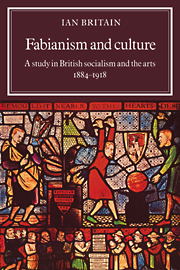Book contents
- Frontmatter
- Contents
- Preface
- List of abbreviations
- Introduction
- PART I THE LITERARY AND ARTISTIC ORIGINS OF FABIAN SOCIALISM
- 1 Thomas Davidson, the New Life Fellowship and the earliest Fabians
- 2 The young Webbs: towards a socialist partnership
- 3 Three Fabian essayists and William Morris
- 4 Bernard Shaw
- PART II ART, AUSTERITY AND PLEASURE IN FABIAN SOCIALISM
- PART III FABIANISM, ÉLITISM AND POPULAR CULTURE
- Conclusion
- Notes
- Bibliography
- Index
3 - Three Fabian essayists and William Morris
Published online by Cambridge University Press: 29 September 2009
- Frontmatter
- Contents
- Preface
- List of abbreviations
- Introduction
- PART I THE LITERARY AND ARTISTIC ORIGINS OF FABIAN SOCIALISM
- 1 Thomas Davidson, the New Life Fellowship and the earliest Fabians
- 2 The young Webbs: towards a socialist partnership
- 3 Three Fabian essayists and William Morris
- 4 Bernard Shaw
- PART II ART, AUSTERITY AND PLEASURE IN FABIAN SOCIALISM
- PART III FABIANISM, ÉLITISM AND POPULAR CULTURE
- Conclusion
- Notes
- Bibliography
- Index
Summary
Clear signs of sympathy with William Morris, or with the socialist principles he represented, may be found in the ideas which Graham Wallas, Sydney Olivier and Annie Besant expounded in their formative years and in their contributions to the Fabian Essays. These ideas provide further pointers to the aesthetic and literary origins of Fabian socialism, and, more particularly, to the strength of the romanticist ingredient in the ideological mixture represented by the Fabians' concerns. There were other important ingredients, of course, in the thought of these three Fabian essayists — including (once again) utilitarian and positivist ideas, as well as the moral force of evangelicalism, left over from a reaction against evangelical theology. That reaction was consistent, in fact, both with a susceptibility to romanticisim and the rationalist streak in utilitarianism. In the very tension it reflected between these dominant philosophies of the age, Fabian socialism points up the dangers involved in drawing any rigid distinctions or clear-cut boundaries between them.
Morris's own criticisms of the Fabian Essays serve to convey the underlying sympathies between him and its authors. This is particularly the case with his treatment of the essay by Graham Wallas on ‘Property under Socialism’. Part of this, he claimed, represented ‘a net statement of the exaggeration of the value of a mechanical system’.
- Type
- Chapter
- Information
- Fabianism and CultureA Study in British Socialism and the Arts c1884–1918, pp. 71 - 95Publisher: Cambridge University PressPrint publication year: 1982

